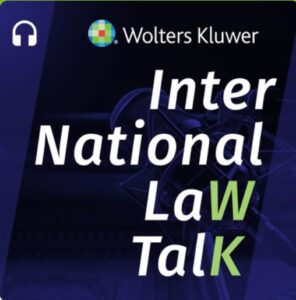 International Law Talk is a series of podcasts through which Wolters Kluwer provides the latest news and industry insights from thought leaders and experts in the fields of International Arbitration, IP Law, International Tax Law and Competition Law. Here at Kluwer Arbitration Blog, we highlight the podcasts focused on international arbitration. In this latest episode, Kiran Nasir Gore, Associate Editor of Kluwer Arbitration Blog, interviews Claudia Salomon.
International Law Talk is a series of podcasts through which Wolters Kluwer provides the latest news and industry insights from thought leaders and experts in the fields of International Arbitration, IP Law, International Tax Law and Competition Law. Here at Kluwer Arbitration Blog, we highlight the podcasts focused on international arbitration. In this latest episode, Kiran Nasir Gore, Associate Editor of Kluwer Arbitration Blog, interviews Claudia Salomon.
Claudia developed her expertise in international arbitration at leading global law firms before launching her practice as an independent arbitrator. She presently serves as President of the ICC International Court of Arbitration and is the first woman to hold this position in its nearly 100-year history. During her first year in the role, ICC has launched a series of initiatives to assure that its dispute resolution services continue to meet the needs of global business.
The podcast discussion centers on technology in arbitration and various disruptions and opportunities that are anticipated to shape the future of dispute resolution. As the world’s preferred arbitral institution, ICC is leading this charge.
The conversation explores:
- The recent evolution in international arbitration, beginning with the accelerated use of virtual and hybrid hearings due to COVID-related lockdowns and precautions, reflecting the adaptability of the international arbitration community, especially as compared to many courts around the world, and new expectations of in house counsel.
- The need for increased consideration of data privacy and cybersecurity in international arbitration, especially as we increasingly exchange digital communications on platforms that may have not been designed or intended for such sustained use. Claudia urges us to read the updated Report of the ICC Commission on Arbitration and ADR Task Force on the Use of Information Technology in International Arbitration, which includes checklists, draft procedural orders, and template data privacy language that can be incorporated into procedural materials.
- How the decentralization of web3, including blockchain technology, digital currencies, and tokenizations, will give rise to new and different kinds of disputes. Claudia comments that, at a basic level, ‘off-the-chain’ disputes that imply web3 will still need to engage with traditional dispute resolution methodologies, including contract interpretation and application of the law. Meanwhile, ‘on-the-chain’ disputes may lead to new modes of dispute resolution and new methodologies and solutions will need to be developed by thought leaders in law, business, and academia.
- The nexus between access to information and the digital transformation of various industries. The decentralization of information has led to the prevalence of new tools, including for example Kluwer’s Profile Navigator and Relationship Indicator tools, which are informed by artificial intelligence and Kluwer Arbitration’s deep archives of legal materials and commentaries.
- Hybrid dispute resolution, including the use of arbitration in conjunction with other methods of alternative dispute resolution (ADR), both on a phased and simultaneous basis. The ICC Task Force on ADR and Arbitration will issue a report later this year, reflecting ICC’s focus on assuring global business has access to all of the tools in the toolbox to resolve their disputes.
Throughout, the conversation touches upon the ICC Court’s upcoming 2023 centenary celebration and the institution’s leadership in the field of international arbitration.
Listen to the discussion: International Disputes and Digital Disruption, in Conversation with Claudia Salomon, President of the ICC International Court of Arbitration.
Follow the coverage of the International Law Talk arbitration podcasts on Kluwer Arbitration Blog here.
________________________
To make sure you do not miss out on regular updates from the Kluwer Arbitration Blog, please subscribe here. To submit a proposal for a blog post, please consult our Editorial Guidelines.


